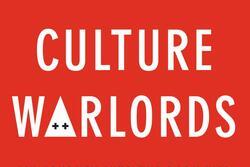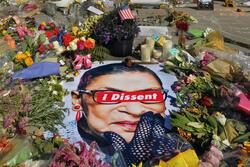The Answer to Rising Fascism in the US? Collective Liberation
Justine Orlovsky-Schnitzler is JWA's politics writer.
For my third piece on the official politics beat for JWA, I was planning to write about how New Year’s resolutions are almost always self-focused, rather than collective. Even during the Jewish New Year, the emphasis is on individual reflection and improvement. I wanted to make the case for thinking about “betterment” as a group activity. But then fascists and white nationalists and Nazis and QAnon believers stormed the US Capitol on January 6, 2021, rendering my original story idea both moot and prescient, all at once.
It was no longer possible to think about anything but the attempted coup; all of Wednesday slipped down the drain as I cycled between staring at Twitter, staring at live television updates, and staring at the wall in my bedroom. I felt the deep exhaustion that comes with being shocked, but not surprised. I was both numb and desperate to quell the part of me screaming we were warned to no one in particular.
It is a privilege, of course, to have felt politically relaxed over the last four years (or, indeed, at any point since this country’s founding). Black activists have spoken extensively about the mental and physical toll of racism, white supremacy, and living in a state of constant alert. This relentless fear, coupled with watching endless cycles of outrage, amnesia, and inaction, is the thief of everyday joy. It sucks the air out of the room. It takes up the space that should be reserved for eating or sleeping or dreaming. Managing fear is a full-time, unpaid, soul-sucking gig.
There is also the burden of response: The people with a target on their backs are expected to do the work of sounding alarm bells, steering the discourse, and managing the feelings of those wringing their hands and looking for direction. Marginalized groups are expected to be experts in dissecting their oppression and repackaging their demands for safety over and over and over again for audiences who only seem to listen when it is trendy to do so.
As Brendan O’Connor wrote for The Nation, “It is tempting to see the violence in Washington, DC, on Wednesday as the death rattle of a disintegrating political order—the Trump administration and its most cultish devotees’ final spasmodic grasp for power... In truth, it is the shape of things to come. Already a litany of elected officials and public figures, Democrats and Republicans, liberals and conservatives, are insisting that ‘this is not who we are’ and ‘this is not America.’ In truth, pressure has been building to this point for some time.”
For an outlet like the Jewish Women’s Archive, it feels, in many ways, downright silly to spend blog space condemning an attempted Nazi-adjacent insurrectionist coup d'état. Of course we condemn it. We are intimately familiar with the dangers of Nazis. The people who need to wake up are asleep at the wheel on purpose; the people who breached the Capitol did so after planning their assault for weeks on public forums.
It would be easy to write a piece that looked to our history as persecuted people as assurance that Jews are wholly united against fascism in this country. It would be soothing to use Jewish as a shorthand for anti-fascist. But it wouldn’t help us meet the enemy at the gate, because the enemy is at the gate and also inside the walls. White supremacy is the air each and every one of us breathes in the United States. And that includes Jewish people: One person who was involved in the attempted coup is the son of a prominent Orthodox judge in Brooklyn.
This week, I asked Jewish organizer Tasha Kaminsky about Jewish investment in whiteness. She told me, “Many of us are white, and we carry all the privileges that our whiteness affords us. We aren't white adjacent. We aren't white passing. We are white. That does not mean we are white supremacists by default. That does mean we are susceptible to our communities being infiltrated with the sickness that is white supremacy...The Jewish community's trauma from the Holocaust is real and unaddressed. [But] our unwillingness to examine how whiteness has dictated our choices and behaviors as a community is not doing us any favors in our survival or on our journey to be better Jews...I know it is scary out there for Jewish people. I know whiteness feels like a shield, and at the same time we want to distance ourselves from people who plainly want us dead. We can't have it both ways though. We can't fear people of color and cling to our whiteness. That is enabling white supremacy.”
Dismissing the Jewish people involved in the riot as not real Jews is a misguided attempt to self-soothe. It sets us adrift on our own island of identity, detached and isolated. The only way to combat fascism is to organize ourselves as part of a broader coalition. Solidarity means confronting our investments in whiteness. We can (and must) hold multiple truths simultaneously: Jewish Americans are in real, present, and urgent danger from white supremacist groups; many Jewish Americans benefit from the white supremacy that is in the bones of this country; our fears and our warnings are valid; we have an obligation to divest from whiteness, even as our hands shake.
If you are a white Jewish person who, like me, felt truly sickened with grief at the image of a rioter at the Capitol wearing a Camp Auschwitz sweatshirt, it is time to develop your plan to organize against white supremacy in 2021. Perhaps you’ve already identified groups tackling issues that are interconnected in our struggle against hate like Never Again Action, Bend the Arc, and Jews for Racial and Economic Justice. Maybe you will commit to sharing your time or your resources with mutual aid funds and efforts local to your area. It may feel frustrating to pour more of yourself out when it feels as if much of the country is turning a blind eye to our pain and fear. But those of us who benefit from whiteness have an obligation to stand in solidarity with those who do not. We must do this because the government does not keep us safe. The police do not keep us safe. More surveillance and additions and adjustments to the definition of terrorism do not keep us safe. We keep ourselves safe—our friends, our family, and our communities.
We have to be prepared when what happened on January 6 is tried again, because it is inevitable. “It cannot be dismissed as a mere stunt,” David Klion wrote for Jewish Currents in their weekly e-newsletter. “If all the insurrectionists achieved was a spectacle, it’s a spectacle that will inspire like-minded Americans for years to come. After all, the Beer Hall Putsch also failed to topple the Weimar government—but a decade later, its leader was appointed chancellor of Germany.”
We have the power to fight what feels inevitable, but only as a cohesive front. It is not too late to change our resolutions for 2021 and commit to collective liberation.








Well-done done and thought provoking article. I realize personally as a feminist Ashkenazi Jewish person that I benefited perhaps on a soci-economic level. However harm or trauma was and has in the past been experienced personally as a mother of children of color. I may "appear" white but do not identify with the white race. Different DNA. And therefore different mindset. Those Jews who demonstrated ag the Capitol are lost souls. God will judge in the end. But while we are in this world Jews (who know their roots/ history) should engage and support active social justice groups. And fortunately there are no shortage of them where I happen to live. I believe in the power of prayer a powerful weapon as well, Praying for our country to reclaim its soul.
I am no longer sure the word "fascism" is useful anymore. It's from the 20th century. What's happening now is somewhat different. We need another word - I think even white-right-extremism or something like that is more useful than fascism.
There was no attempted coup. It was horrible to say the least. But an attempted coup. No, that is an overstatement. What is missing is a balanced perspective. There were some from the far left there also from the news reports. We are in danger from both the radical right and the left. But a coup. Get real.